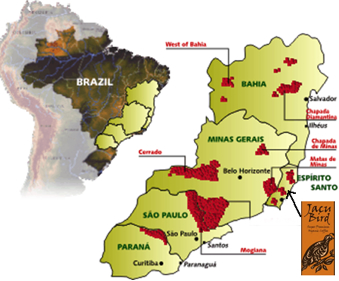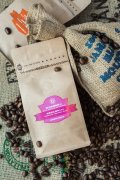The rarest coffee in the world: Brazilian bird shit coffee
Camocim Estate:Jacu Bird Coffee
History: In the 1960s and 1970s, when Brazil's Camocim farm was still under the old Sr. When Olivar Fontenelle de Araújo was under his name, he came up with various ways to protect the forest of the farm, such as introducing exotic species such as Pinus Elliottii and Eucalyptus, planting orchid plants of Lagerstroemia family, building small reservoirs, etc., thus opening the transition of Camocim into a modern organic and biodynamic farm.
In the 1980s and 1990s, these efforts began to bear fruit, improving the ecological environment of farms and greatly increasing wildlife.
In 1999, in order to inherit the pioneering spirit of his 92-year-old grandfather, farmer Sr. Henrique Sloper Araújo decided to introduce organic coffee growing methods and grow coffee on slopes more suitable for coffee.
Camocim Farm has approximately 123.5 acres (50 hectares) under coffee cultivation, and although some slash pine trees have been felled, the biodiversity of the farm has been preserved. Initially coffee was grown mainly in forest clearings and shady woodlands. Today coffee is grown only on terrace slopes with natural vegetation. The farm regularly prunes coffee trees and leaves and twigs are returned to the field as compost to improve soil organic matter.
Today, this organic method of cultivation, which balances natural forests and vegetation, has become a model for Brazil's future eco-friendly coffee production.
Jacu Bird Coffee
Camocim Farm, Pedra Azul in Espirito Santo, Brazil, is famous for its South American bird called the Jacu. This bird lives in shady coffee groves and eats ripe coffee berries, which is the natural selection process for producing high-quality coffee.

Farmer Henrique Sloper does not see the birds, which eat ripe coffee berries, as pests, but as natural additions to the farm flora and fauna, so Camocim welcomes them Jacu Bird, who see them as part of the farm's agricultural ecosystem, uses them as the most effective coffee fruit picking "workers". Once the birds eat the ripe coffee fruit and defecate under the coffee tree, the farm workers collect these odor-free bird droppings and send them to a special drying site to dry and clean them until they are shelled (Parchment) beans, and store them for about 3 months. Jacu Bird coffee has a pleasant, soft taste, with a hint of nutty sweetness and dryness, lingering molasses, moist notes of dark bread and a hint of black pepper.
Jacu Bird is sweet, thick and slightly tart than traditional Brazilian coffee grown at Camocim Farm. This is undoubtedly the rarest coffee in the world.
Jacu Bird Coffee:
Farm Name:
Farm Founder:
Current farmer:
Large producing area:
Small producing area:
Altitude:
Annual rainfall:
Coffee varieties:
Processing method:
Drying method:
flowering period:
Harvest period:
Other related information:Camocim Estate (Jacu Bird Coffee)
Olivar Fontenelle de Araújo
Henrique Sloper
Espirito Santo
Pedra Azul
400-500 m above sea level
1500-2000 mm
Bourbon, Icatu, Catuai
Bird-processed
sun drying on a bed
August-December
May-September
Camocim Estate has been certified as an organic farm by Instituto Biodinamico do Brazil
In November 2009, Henrique Sloper's Brazilian friends brought me Camocim Farm's Bird Shit Coffee and several other organic coffees when they came to China. It happened that my friend Jaspercoffee who made coffee in Australia returned to Beijing for a small gathering. We tasted Jacu Bird Coffee at @ Brown Coffee in Wangjing Science Park.
Due to the rapid growth of coffee consumption market in China in recent years, the world has attracted attention. During the Shanghai Coffee Show in November 2013, all the leaders of the Brazilian Coffee Association and the Brazilian Fine Coffee Association arrived in Shanghai and organized the Brazilian Coffee Tasting Conference. Of course, Henrique Sloper gave us birdshit coffee again.
At the end of April 2014, at SCAA's 26th annual meeting in Seattle, USA, we met Mr. Henrique Sloper again. This time, in addition to raw beans, we also gave them a can of bird shit coffee roasted in Brazil (there were many people at the exhibition, so we had to drop it out quietly).
After returning to Beijing at the beginning of May, I called my buddy and couldn't wait to pour bird shit coffee, not for anything else, just because it was rare.
Because the cooked beans were specially prepared for friends during SCAA annual meeting, and they were packed in tin cans, they not only tasted good, but also had a preservation effect far beyond that of the bags. So hurry to Beijing Haidian District Suzhou Street Haidian Book City @ Carving Time Coffee Institute-Beijing to share with friends, must!
Henrique Sloper told us that he is increasingly interested in China as a fast-growing coffee consumer market, and he will be returning later this year to bring his Birdshit Coffee and other organic coffees to share with friends at the Carving Time Coffee Academy in Beijing. Interested friends, follow @ Carving Time Coffee Academy-Sina Weibo in Beijing.
PS. Jacu Bird Coffee seems to be translated directly into Chinese as "Phoenix Crown Young Coffee" is more appropriate and more elegant, but in order to facilitate memory, it still cannot be translated into "Bird shit Coffee".
Important Notice :
前街咖啡 FrontStreet Coffee has moved to new addredd:
FrontStreet Coffee Address: 315,Donghua East Road,GuangZhou
Tel:020 38364473
- Prev

Coffee Bean-Tanzania #8226; Lub AAA
Tanzania Lub AAA Coffee Bean-Tanzania Lub AAA, volcanic soil creates its ripe and full fruit and unique aroma, soft and refreshing fruit acid, rich taste but not strong. It's obvious. AAA here is a grade of coffee, and only super good coffee beans can win this honor.
- Next

Ethiopian coffee
Ethiopia is the hometown of Arabica coffee, and it is in the forests of Kaffa that you can see wild Arabica coffee. In Ethiopian, coffee is called "Bun" or "Buna". Coffee beans (coffee bean) may be translated from "Kaffa Bun". Arabica coffee was discovered early in the Harald area.
Related
- Guji coffee producing area of Guji, Ethiopia: Humbela, Shakiso, Wulaga
- What is the most expensive variety of Qiloso in BOP multi-variety group?
- How to store the coffee beans bought home?
- Why are Yemeni coffee beans so rare now?
- Ethiopian Sidamo all Red Fruit Sun Sun Santa Vini Coffee beans
- SOE is mostly sour? What does it mean? Is it a single bean? what's the difference between it and Italian blending?
- Is Italian coffee beans suitable for making hand-brewed coffee?
- How to choose coffee beans when making cold coffee? What kind of coffee beans are suitable for making cold coffee?
- Just entered the pit to make coffee, what kind of coffee beans should be chosen?
- Can only Japan buy real Blue Mountain Coffee? What are authentic Jamaican Blue Mountain coffee beans?

